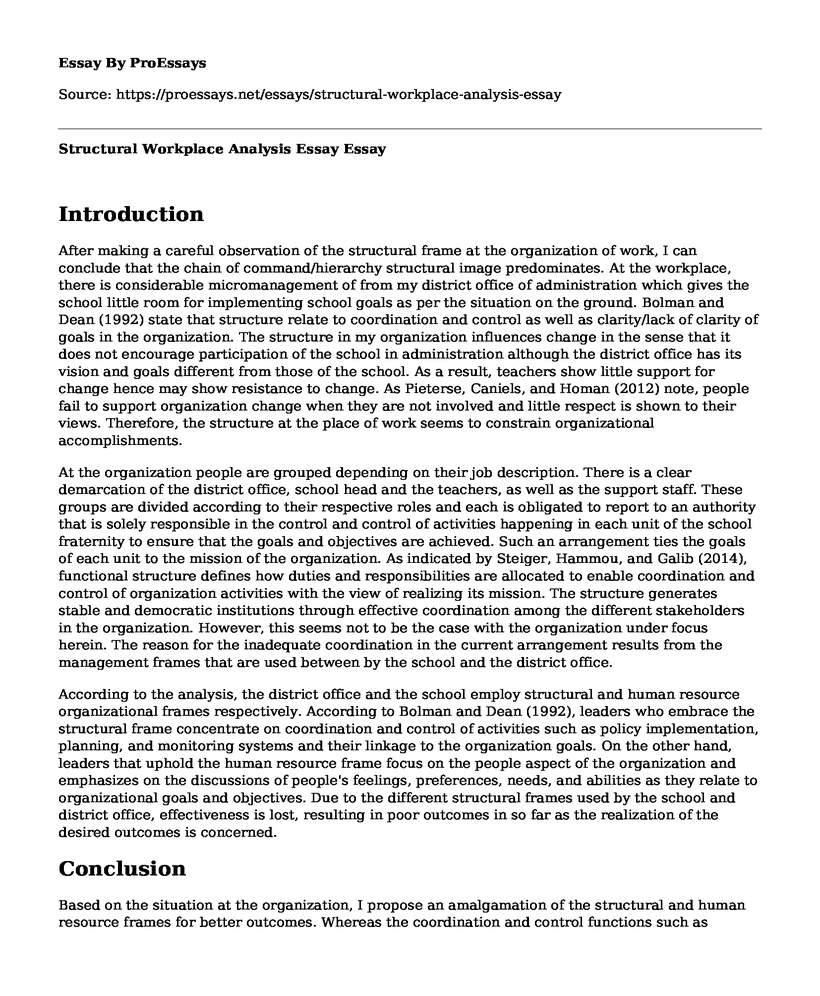Introduction
After making a careful observation of the structural frame at the organization of work, I can conclude that the chain of command/hierarchy structural image predominates. At the workplace, there is considerable micromanagement of from my district office of administration which gives the school little room for implementing school goals as per the situation on the ground. Bolman and Dean (1992) state that structure relate to coordination and control as well as clarity/lack of clarity of goals in the organization. The structure in my organization influences change in the sense that it does not encourage participation of the school in administration although the district office has its vision and goals different from those of the school. As a result, teachers show little support for change hence may show resistance to change. As Pieterse, Caniels, and Homan (2012) note, people fail to support organization change when they are not involved and little respect is shown to their views. Therefore, the structure at the place of work seems to constrain organizational accomplishments.
At the organization people are grouped depending on their job description. There is a clear demarcation of the district office, school head and the teachers, as well as the support staff. These groups are divided according to their respective roles and each is obligated to report to an authority that is solely responsible in the control and control of activities happening in each unit of the school fraternity to ensure that the goals and objectives are achieved. Such an arrangement ties the goals of each unit to the mission of the organization. As indicated by Steiger, Hammou, and Galib (2014), functional structure defines how duties and responsibilities are allocated to enable coordination and control of organization activities with the view of realizing its mission. The structure generates stable and democratic institutions through effective coordination among the different stakeholders in the organization. However, this seems not to be the case with the organization under focus herein. The reason for the inadequate coordination in the current arrangement results from the management frames that are used between by the school and the district office.
According to the analysis, the district office and the school employ structural and human resource organizational frames respectively. According to Bolman and Dean (1992), leaders who embrace the structural frame concentrate on coordination and control of activities such as policy implementation, planning, and monitoring systems and their linkage to the organization goals. On the other hand, leaders that uphold the human resource frame focus on the people aspect of the organization and emphasizes on the discussions of people's feelings, preferences, needs, and abilities as they relate to organizational goals and objectives. Due to the different structural frames used by the school and district office, effectiveness is lost, resulting in poor outcomes in so far as the realization of the desired outcomes is concerned.
Conclusion
Based on the situation at the organization, I propose an amalgamation of the structural and human resource frames for better outcomes. Whereas the coordination and control functions such as control, coordination, budgeting, planning, policies, and procedures are essential for an organization to achieve its goals and sustain efforts towards its vision, the people aspect is equally important because it is the people that implement organizational goals. When there is little focus in the peoples' feelings, needs, preferences, and abilities, empowerment cannot be achieved hence efforts towards goal achievement can be undermined. When subordinates are involved, and their concerns, needs, and views are addressed, they are likely to develop trust in management and also reduce chances of resisting change (Pieterse et al., 2012; Morgan & Zeffane, 2003). Thus, incorporating the concerns and needs of stakeholders such as teachers and parents is critical for the district office to achieve the goals of the schools. Being the person charged with building the capacity of teachers, embracing feedback and collaboration has been critical to our success. For this reason, the district office and school should adopt this approach because results show that it helps in the realization of both organizational and individual goals, an outcome that is critical for sustainable growth and development in schools.
References
Bolman, L. G., & Deal, T. E. (1992). Leading and managing: Effects of context, culture, and gender. Educational Administration Quarterly, 28(3), 314-329. doi:10.1177/0013161x92028003005
Morgan, D., & Zeffane, R. (2003). Employee involvement, organizational change and trust in management. The International Journal of Human Resource Management, 14(1), 55-75. doi:10.1080/09585190210158510
Pieterse, J. H., Caniels, M. C., & Homan, T. (2012). Professional discourses and resistance to change. Journal of Organizational Change Management, 25(6), 798-818. doi:10.1108/09534811211280573
Steiger, J. S., Hammou, K. A., & Galib, M. H. (2014). An Examination of the influence of organizational structure types and management levels on knowledge management practices in organizations. International Journal of Business and Management, 9(6), 43-57. doi:10.5539/ijbm.v9n6p43
Cite this page
Structural Workplace Analysis Essay. (2022, Nov 16). Retrieved from https://proessays.net/essays/structural-workplace-analysis-essay
If you are the original author of this essay and no longer wish to have it published on the ProEssays website, please click below to request its removal:
- Career Choice Evaluation: IT, Cyber Security, Enviornmetal Scientist
- Career and Reasons Why Ethics and Integrity is Vital in my Future Practice
- Changes in the Healthcare Job Market and Its Effect on Recruitment Essay
- Retirement Transition Essay
- Essay on Proper Interview Etiquette
- Student Development and Career Decision-Making Paper Example
- Admission Essay Sample on Helping People, Saving Lives: My Dream Journey from Russia to the USA







